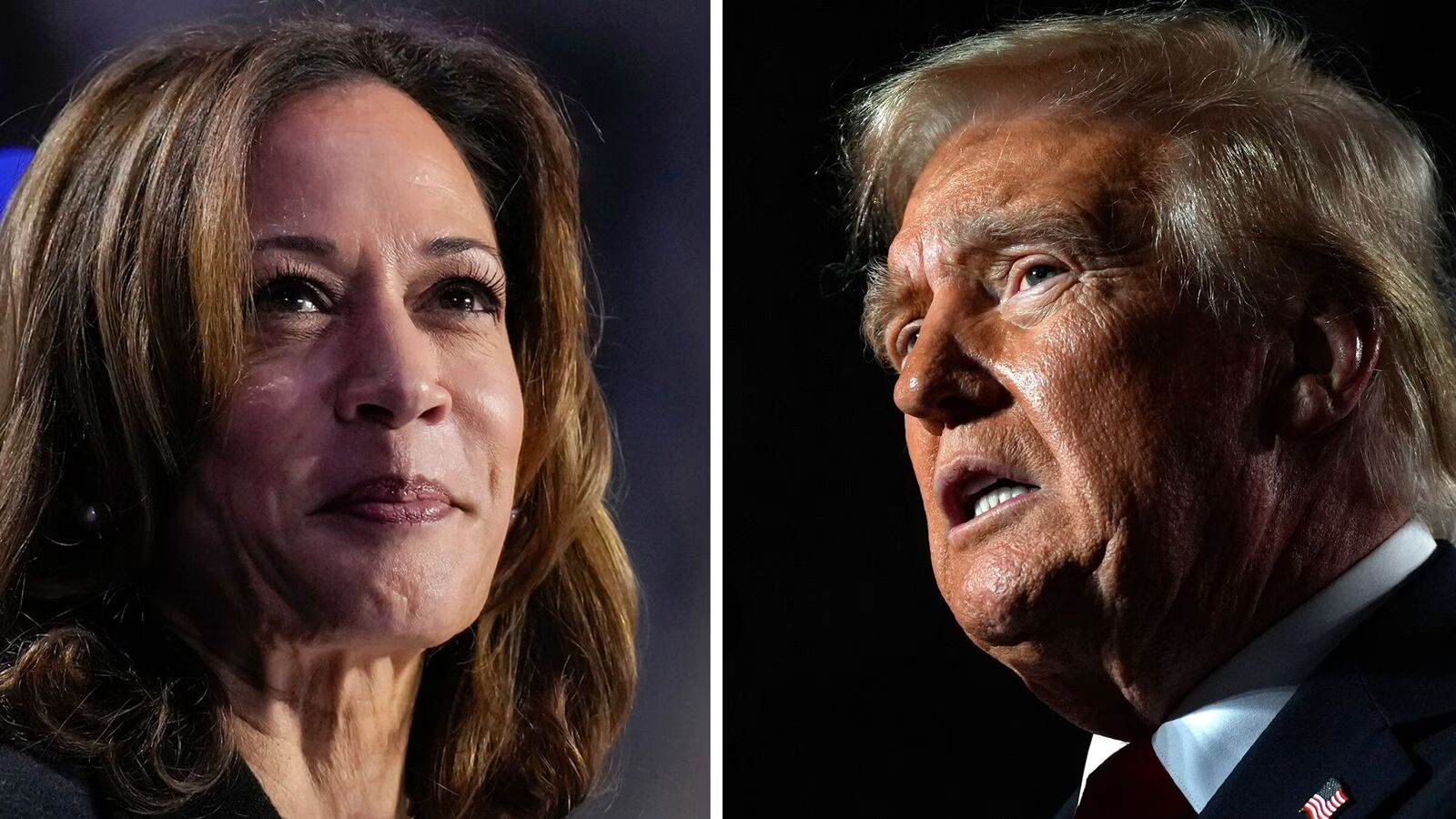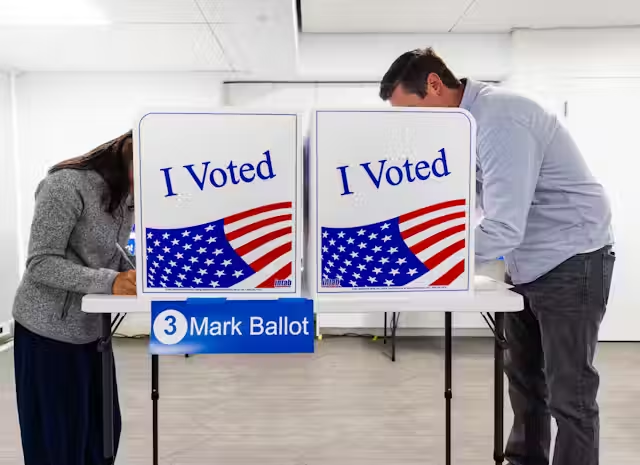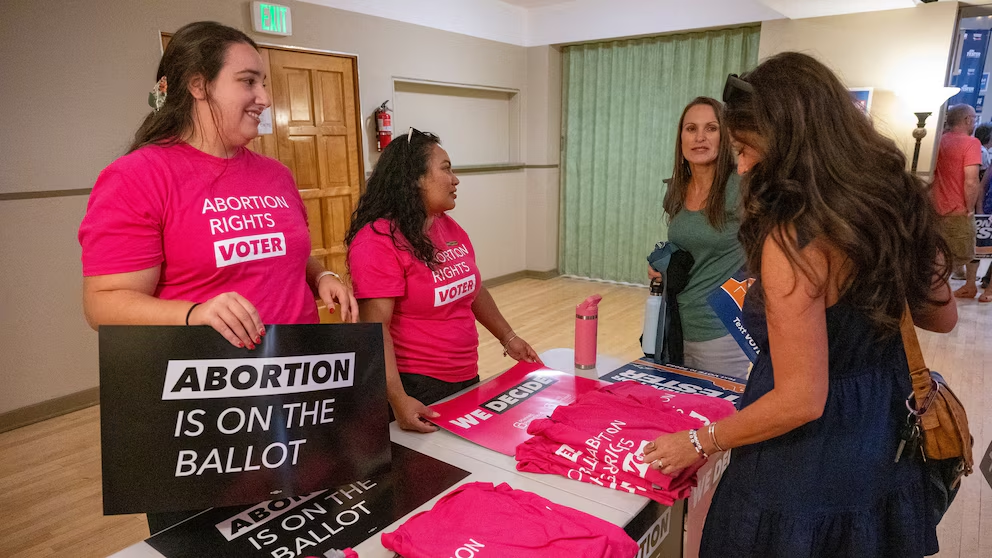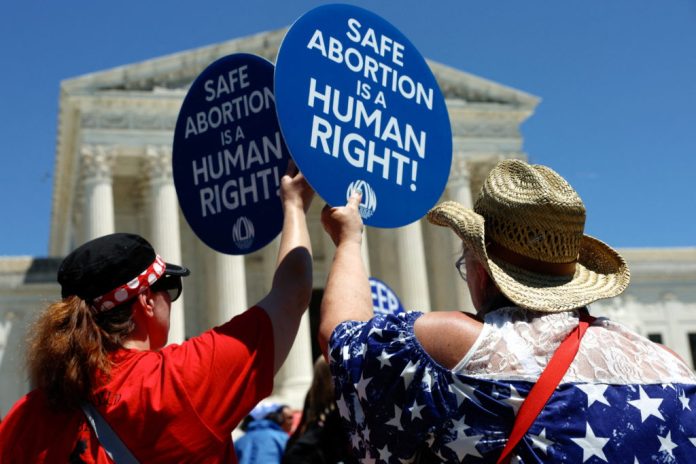In the lead-up to the 2024 election – The US Voters, abortion rights have emerged as a top concern for voters across the country.
The 2024 U.S. election marks a significant milestone as the first national election following the Supreme Court’s decision to overturn Roe v. Wade, which had guaranteed abortion rights in the U.S. since 1973. For many US voters, this historic ruling looms large in their minds as they head to the polls, making it a critical issue this election day.
US voters across several states, including Montana, Arizona, Missouri, Nebraska, Colorado, Florida, Maryland, Nevada, New York, and South Dakota, are now being asked to determine how their state will handle abortion regulations going forward. This shift places a pivotal issue in the hands of the states, highlighting a significant change in American politics.
A recent poll conducted by The New York Times and Siena College showed that abortion is now a top election issue for US voters, second only to the economy. For women and younger voters, however, abortion has surpassed the economy as the most critical concern, emphasizing the gravity of the issue for certain demographics. An October report by the non-governmental organization KFF also underscores this trend, revealing that for women under the age of 30, abortion has become the foremost issue—superseding even inflation, which had previously been a major concern earlier in the year.
In terms of public figures, there’s a clear divide on trust regarding abortion policy. According to KFF’s findings, twice as many women believe Vice President Kamala Harris would handle abortion rights more effectively than former President Donald Trump. Harris has made reproductive rights a cornerstone of her campaign, advocating for legislation that would protect these rights on a federal level. Trump, on the other hand, has faced challenges in establishing a consistent message on abortion, despite his involvement in the Supreme Court appointments that led to Roe v. Wade’s reversal.
With polls open and voters casting ballots, security around prominent locations such as the White House is noticeably heightened, with police cars, officers, and canine units patrolling the area. Eight-foot fences line the perimeter of the White House, serving as a symbol of the increased caution in place. At the U.S. Capitol, additional barriers, complete with “Police Line: Do Not Cross” signs, add to the visible sense of apprehension surrounding this contentious election. Many businesses in the area have boarded up their windows, indicating a community on edge, though business owners have refrained from making public comments on their preparations.
This heightened level of security is evident beyond Washington, D.C., as businesses in various states, including Oregon, Pennsylvania, and California, have taken similar precautionary measures. Recent reports have also highlighted potential election-related threats. According to The Detroit News, the FBI has made two arrests in Michigan in connection to election-related threats, underscoring a climate of tension and vigilance.
In one case, a suspect allegedly threatened former President Trump. Isaac Sissel, the suspect, reportedly posted under a pseudonym on social media and later told authorities that he believed the nation would benefit if Trump were no longer alive. Another individual, Christopher Clay Pierce, allegedly threatened a Democratic political action committee (PAC) over the past two years. This incident reportedly occurred despite previous warnings from the FBI, suggesting that some individuals may be willing to disregard legal risks in pursuit of their beliefs.

Mint
Meanwhile, in western North Carolina, rain has not deterred local US voters from casting their ballots. Polling stations in the area, including temporary installations replacing damaged sites, have seen a steady turnout despite the weather. According to Richard Coleman, the polling director in Burke County, there has been “higher than average” turnout at his location, with nearly 100 voters by midday—a notable number given the rural nature of the area. Early voting in this region had already seen a record number of ballots cast, which bodes well for Republican candidates given the area’s historically strong support for Trump.
In Pennsylvania, legal disputes related to election protocol have also made headlines. The Northampton County Republican Committee (NCRC) filed a legal complaint, alleging that local officials failed to provide a list of election judges and inspectors as they have done in previous elections. The NCRC claims that this lack of transparency places the Republican Party at a disadvantage on election day, stating that the county is acting in a “partisan” manner that aims to hinder the committee’s efforts. The NCRC’s legal filing calls for a judge to order the release of official lists for every polling station in the county.
Election-related incidents have not been limited to local disputes. In Georgia, Secretary of State Brad Raffensperger confirmed that multiple polling locations in Fulton County received bomb threats earlier in the day. However, these threats were later deemed non-credible and believed to have originated from Russian sources. Raffensperger remarked on the persistence of these international interference attempts, stating, “We catch ‘em every time,” and noting that the motive behind these actions is to destabilize the nation. Voting at affected locations resumed following brief evacuations.
For many US voters, this day carries an undercurrent of anxiety as threats, legal conflicts, and heightened security measures continue to unfold. The atmosphere has been dampened by rain in parts of the country, adding to the tense ambiance. Yet, voters remain committed, determined to have their voices heard.
In North Carolina, temporary polling stations are helping US voters in rural regions overcome logistical challenges. Richard Coleman, managing a polling station at a tent installation in Burke County, reported a strong turnout even in challenging conditions, signaling the determination of US voters in this largely Trump-supporting region. This turnout is essential for Republican candidates who will need robust support from their base to compete in a highly contested election.
Legal action has also been active in Pennsylvania, where the Northampton County Republican Committee filed a lawsuit accusing local officials of withholding essential information. The NCRC claims that Northampton County did not provide a list of election judges and inspectors, a practice it has adhered to in previous elections. The committee argues that this information is critical for the election process, and the lack of cooperation places Republican candidates at a disadvantage.

In Georgia, security concerns reached a heightened level when bomb threats targeted polling locations in Fulton County. Fortunately, these threats were quickly deemed non-credible and traced to Russian sources, indicating an attempt to disrupt the election. Secretary of State Brad Raffensperger reassured the public, stating that similar incidents are consistently detected and thwarted, highlighting a continued effort by foreign entities to destabilize American democracy. Voting at the affected polling stations resumed shortly after evacuations, and US voters continued to exercise their rights.
Despite weather challenges, threats, and heightened security, US voters have shown resilience, making it clear that they will not be deterred. Reports from polling stations indicate a strong turnout in rural areas, suggesting that both sides of the political spectrum are mobilized for this significant election. This election will likely set the stage for the future of abortion rights in the United States and determine how the nation approaches one of its most polarizing issues since the reversal of Roe v. Wade.
As evening approaches and more results are expected, the nation awaits the outcome with anticipation and, in some places, unease. For now, the only certainty is that today’s election will be remembered as one of the most pivotal in recent American history, with millions of US voters standing united in their determination to shape the nation’s future amidst challenging circumstances.
As US voters head to the polls in today’s historic election, it’s clear that early voting has helped alleviate some of the pressures typically seen on Election Day. In Atlanta, Georgia, the traditionally Democratic city has seen lighter lines at polling stations, in large part due to early voting. Over half of Georgia’s voters—more than four million people—cast their ballots before today, reducing congestion and ensuring broader access.
David Schnee, a poll-watching volunteer for the Democratic Party in Georgia, expressed concern about new rules impacting voting. In the 2020 election, US voters in Georgia could still cast provisional ballots if they accidentally went to the wrong polling station. However, this year, the rule has changed: any voter who arrives at the wrong station before 5 p.m. cannot cast a provisional ballot. To counter this, Schnee and other volunteers have coordinated rides for voters, sometimes needing to drive over an hour to reach the correct location. Schnee emphasized the lengths volunteers are going to in order to support voters affected by the changes, a concern echoed by many US voters in the area.
Adding to concerns about accessibility, the FBI issued warnings earlier today about fraudulent videos circulating online. These fake videos aimed to deceive US voters by alleging widespread terrorist threats at polling stations and claiming fraudulent votes at prisons in several key states. These videos, crafted to resemble a press release from the FBI and a news segment from CBS, have not reached a broad audience but still have the potential to spread misinformation. Both the FBI and CBS clarified that the videos are “fabricated,” with the FBI further warning that such content aims to weaken the democratic process and reduce trust in the election system.
Abortion access is another critical issue for US voters this year, and Florida stands out as one of ten states with a ballot measure addressing abortion regulations. Voters there are considering overturning the state’s existing six-week abortion ban, potentially expanding the window for legal abortion to the point of fetal viability, around 24 weeks. Former President Donald Trump, who cast his ballot in Florida this morning, has faced notable challenges in addressing this issue.
When questioned about how he voted on this measure, he sidestepped, saying, “Just stop talking about that.” This response underscores Trump’s struggle to articulate a consistent stance on abortion. Just a few months ago, he appeared to support the measure but quickly clarified he would oppose it after facing backlash from conservative voters.
Trump’s opponent, Kamala Harris, has also been cautious about commenting on a similarly divisive ballot measure in her home state of California. This measure would increase sentencing for specific drug and theft offenses. When asked for her opinion on the issue, Harris declined, saying, “I am not going to talk about the vote on that because, honestly, it’s the Sunday before the election, and I don’t intend to create an endorsement one way or the other.”
For some US voters, navigating recent changes in state voting requirements has posed unexpected challenges. Teerica Doward, a Georgia resident, found herself in such a predicament after recently moving. She had not realized her voter registration was still associated with her former address, which was a 30-minute drive from her current residence. Doward voiced frustration over these new rules, believing they place an unnecessary burden on working-class voters in Georgia. “I feel like it’s all set up to be the way it is, and I wish we could just vote wherever we are,” Doward said. Despite the inconvenience, she confirmed her unwavering support for Harris, saying, “I know who I’m voting for, I’m voting for Kamala Harris.”
This year’s election in Georgia holds particular significance due to the narrow margin of victory that occurred in 2020. Then, Joe Biden won the state by fewer than 12,000 votes, making every vote even more crucial in 2024. Kamala Harris has emphasized the importance of voter turnout in several radio interviews today, urging Americans to “get out and vote.” On Atlanta’s WVEE-FM, she stated, “We’ve got to get it done. Today is voting day, and people need to get out and be active.”
Harris also reflected on the historic nature of her potential presidency. During an interview on The Big Tigger Morning Show in Georgia, she highlighted her journey, mentioning that she would be the first president from an HBCU (historically black college or university) background if elected. She shared that she planned to host her election night party at Howard University, her alma mater, making this a “full circle” moment for her.
Later, in an interview with Pittsburgh’s Big K Morning Show, Harris mentioned that her family would be joining her for dinner before her election night celebration, as many relatives were already staying with her in anticipation of the big night.

Across the country in Alexandria, Virginia, another traditionally Democratic stronghold, US voters were turning out at a steady pace. In Old Town Alexandria, volunteers from both parties greeted voters with informational sample ballots and even treats. While Republicans handed out lollipops, the Democrats offered chocolate-chip cookies, a small gesture that was appreciated by reporters covering the election.
In New Hampshire, the small town of Dixville Notch continued its tradition of casting the first votes in the nation, a practice dating back to 1960. At the stroke of midnight, six residents voted, and the results—split evenly between Trump and Harris—highlighted the tight competition in this election. Despite Dixville Notch’s modest numbers, this early count has become an iconic part of U.S. election history.
With polling locations now open in all U.S. states, including the final ones in Hawaii, the nation is in full voting mode. Hawaii, holding four electoral college votes, will keep polls open until 7 p.m. local time, making it one of the last states to close. Some polling stations in Alaska will remain open for another hour beyond that, creating anticipation as results gradually come in.
In Florida, former President Trump cast his US voters at the Mandel Recreation Center in Palm Beach, alongside his wife, Melania. Wearing his signature red cap, Trump exuded confidence as he spoke to reporters, saying, “I feel very confident…and it looks like Republicans have shown up in force.” He expressed satisfaction with the turnout, noting the lengthy lines he observed. “I hear we’re doing very well,” Trump added, alluding to the enthusiasm he believes is present among his supporters.
Inside the polling location, an unidentified woman dressed in bright blue pants cast her vote shortly after Trump. After being screened and searched by security, she hinted that her vote was unlikely to align with Trump’s. When asked, she declined to share whom she voted for but implied her support might lie with Harris.
As the day progresses, polling places across the country are reporting steady participation. In traditionally Democratic and Republican areas alike, US voters have turned out to make their voices heard, spurred on by key issues like abortion access and the importance of safeguarding democratic processes. US voters have shown resilience, overcoming challenges presented by new voting rules and misinformation campaigns alike.
The influence of early voting has played a significant role in today’s turnout, with many states reporting more than half of eligible US voters having already cast their ballots before Election Day. This trend, along with heightened security measures, speaks to the importance of this election in the minds of US voters, who are determined to participate regardless of obstacles.
As polls begin to close, the nation holds its breath, waiting to see how US voters have shaped the future on critical issues and the direction of leadership in the coming years. This year’s election reflects the urgency and intensity of a nation facing change, with a divided but passionate electorate ready to make its voice heard.




